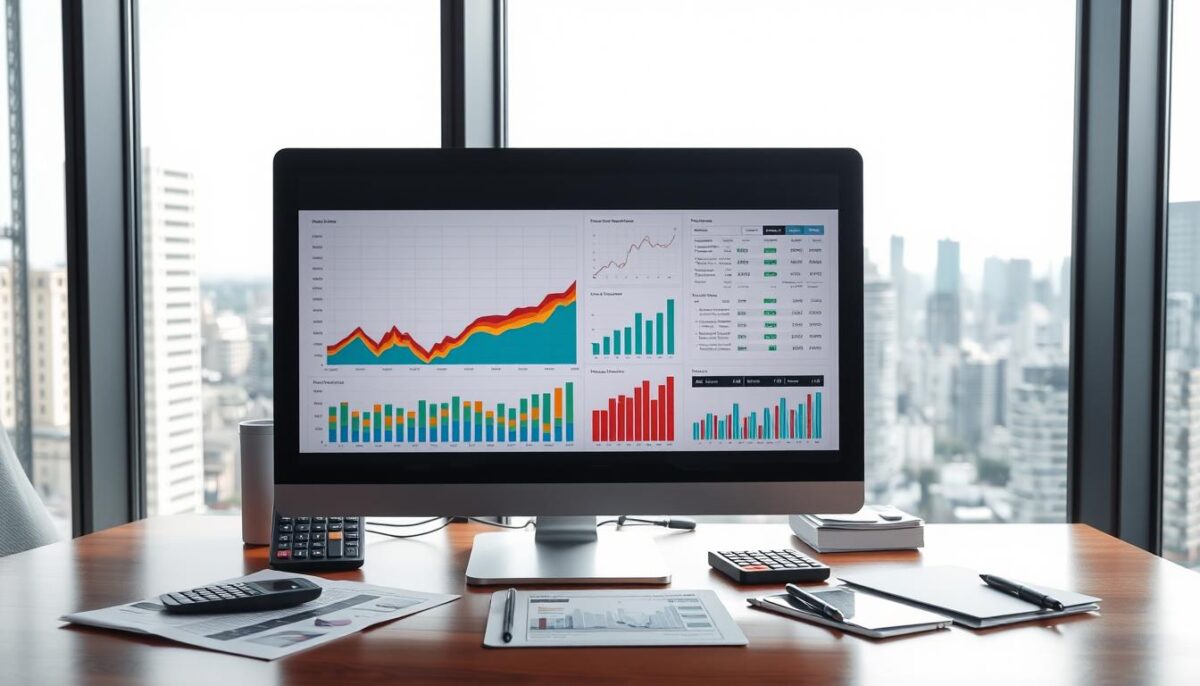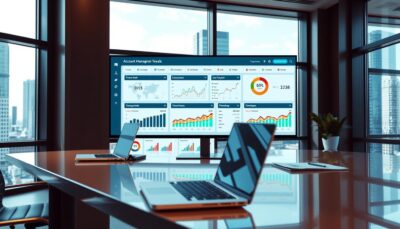In today’s fast-paced business world, managing money well is key to growing and staying ahead. Budgeting reporting software is a game-changer for companies. It does more than just track money; it helps plan finances, makes sure numbers are right, and gives instant insights for smarter choices.
For businesses aiming to grow steadily, managing and understanding financial data is vital. Budgeting reporting software helps us dive deep into our financial health. It lets us spot trends, use resources better, and make choices that move our companies forward. By looking into the main features, advantages, and top picks, we can find the best software for our business needs.
Table of Contents
Key Takeaways
- Budgeting reporting software is a powerful tool for streamlining financial management and driving business growth.
- These solutions offer a comprehensive suite of features, including expense tracking, financial analytics, and real-time data reporting.
- Using budgeting reporting software can lead to increased accuracy in financial reporting, enhanced decision-making capabilities, and improved collaboration within the organization.
- Choosing the right budgeting reporting software requires considering factors such as cost, customization, and integration with existing systems.
- Implementing budgeting reporting software effectively involves training staff, setting realistic goals, and continuously measuring the impact on the business.
Understanding Budgeting Reporting Software
In today’s fast-paced business world, managing costs, forecasting budgets, and monitoring expenses is key for growth. Budgeting reporting software is a powerful tool for this. It offers advanced features and real-time insights for better decision-making.
What is Budgeting Reporting Software?
Budgeting reporting software is a financial management solution for businesses. It provides a central platform for tracking, analyzing, and reporting financial data. It has features like real-time budget tracking, forecasting, and integration with other financial systems. This helps organizations understand their financial processes better.
Key Features to Look For
- Real-time reporting and data visualization: Budgeting reporting software should offer intuitive dashboards and reporting tools. These provide a clear, up-to-date view of a company’s financial status.
- Forecasting and scenario planning: Robust forecasting capabilities help businesses predict future financial trends. This enables them to make informed decisions about cost management and budget allocation.
- Collaboration and accessibility: The software should make team-based collaboration easy. It should allow stakeholders to access and contribute to the budgeting process from anywhere.
- Integration with existing systems: Seamless integration with accounting, ERP, and other financial systems streamlines data management and reporting. This reduces manual effort and the chance of errors.
By using these key features, businesses can improve their cost management, budget forecasting, and expense monitoring. This leads to sustainable growth and increased profitability.
Benefits of Using Budgeting Reporting Software
Using budgeting reporting software can bring many benefits to businesses. It helps us improve our financial operations. With advanced analytics, these tools make our financial reports more accurate and clear. This helps us make better decisions for our business’s growth.
Increased Accuracy in Financial Reporting
Budgeting reporting software makes our financial reports more precise. It combines data from different sources, making analysis easier. This reduces errors and gives a true view of our financial health.
Enhanced Decision-Making Capabilities
These tools give us deep insights into our finances. With financial analytics, we can make smarter choices. We can see where we can save and make decisions that fit our goals.
“By integrating budgeting reporting software into our financial operations, we have gained unparalleled visibility into our company’s performance, empowering us to make more informed, data-driven decisions that propel our business forward.”
Using budgeting reporting software does more than just report finances. It helps us make decisions that grow our business. As we use these tools more, we’ll see better financial management and smarter choices.
Top Budgeting Reporting Software Options
Managing your business finances is easier with the right budgeting reporting software. QuickBooks, Adaptive Insights, and Planful are top choices. They offer features for better expense tracking, financial analytics, and budgeting.
QuickBooks
QuickBooks is a popular choice for managing finances. It has an easy-to-use interface and powerful reporting tools. It helps track expenses and understand financial performance.
QuickBooks also connects with other apps like payroll and inventory. This makes managing finances simpler.
Adaptive Insights
Adaptive Insights is a cloud-based software for advanced financial analytics. It lets businesses create dynamic budgets and reports. This way, they can analyze data in real-time and make better decisions.
Its team features make it easy to work together. Everyone stays on the same page with the company’s financial goals.
Planful
Planful, formerly Host Analytics, focuses on financial planning and analysis. It offers strong forecasting and reporting tools. This helps businesses understand their financial health better.
Planful also integrates with many ERP systems and data sources. This makes financial analytics easier.
When choosing budgeting reporting software, think about your business’s needs and budget. Look at the features, user experience, and integration capabilities. Make sure the software fits your financial management goals and supports your company’s growth.
Comparing Budgeting Reporting Software Prices
Businesses looking into budgeting reporting software need to think about the cost. It’s important to know the upfront price and the long-term gains. This helps them choose the right tool for their needs.
Initial Costs vs. Long-Term Benefits
The cost of budgeting reporting software can differ a lot. It depends on the company size, software complexity, and customization needs. Even if some software costs more at first, the benefits like better cost management, budget forecasting, and expense tracking can be worth it.
When looking at budgeting software, think about the return on investment (ROI). Consider how much time and resources you’ll save. Also, think about how the software will help you make better financial decisions. This will help you see the real value of the software and make a smart choice.
Free Trials and Demos
- Many budgeting reporting software providers offer free trials or demos. This lets businesses try the software before buying.
- These trial periods are great for seeing how the software works, how easy it is to use, and if it fits your needs.
- Using these chances to try out software helps businesses make a better choice. They can pick the right budgeting reporting software for their needs.
| Software | Initial Cost | Potential Long-Term Benefits |
|---|---|---|
| QuickBooks | $25 – $150 per month | Improved expense tracking, automated invoicing, and real-time financial insights |
| Adaptive Insights | Contact for pricing | Enhanced budget forecasting, scenario planning, and collaborative decision-making |
| Planful | Contact for pricing | Streamlined cost management, advanced reporting, and improved financial visibility |
By looking at the costs and benefits of budgeting reporting software, businesses can make a smart investment. This investment can help their growth and financial success.
How Budgeting Reporting Software Improves Collaboration
Budgeting reporting software is key to better team work and talk in companies. It makes financial info clear and easy to use. This leads to a more open and smooth work place.
Team Accessibility and Communication
One big plus of budgeting software is it lets everyone see financial data. Teams can see how money is being used and plan better. This makes talking about money and goals easier and more clear.
Real-Time Data Sharing
Real-time data sharing is a big win for today’s businesses. Teams can see the latest financial info. This helps them track spending, spot trends, and adjust plans based on facts. It makes companies work better and reach their goals faster.
Using budgeting software helps companies be open about money and make choices based on facts. This makes teams work better together, talk more clearly, and grow in a lasting way.
“Budgeting reporting software has changed how our teams work together. The real-time data sharing and visibility have improved our ability to manage resources effectively and make informed financial decisions.”
Customization and Scalability in Budgeting Tools
Choosing the right budgeting reporting software is key. Every business is different, and a one-size-fits-all approach won’t work. We need a flexible system that meets our specific needs and grows with us.
Tailoring Software to Our Needs
First, we must understand our business needs. What reports do we need? How should we structure our budgets? What level of detail is required for cost management and spend analysis? Knowing this helps us find budgeting reporting software that can be customized to fit our workflows.
Growth Considerations for Businesses
When choosing budgeting tools, think about your company’s future. The software should grow with your business. Look for solutions with scalable pricing, the ability to add users and features, and advanced budgeting and reporting capabilities. This ensures your financial management tools stay effective as your business grows.
| Feature | Importance for Customization and Scalability |
|---|---|
| Customizable Reporting | Allows us to tailor the software to our specific reporting needs and preferences. |
| Flexible Budgeting Structures | Enables us to organize our budgets in a way that aligns with our business model and processes. |
| Scalable Pricing and User Management | Ensures the software can grow alongside our business, accommodating increasing needs and team sizes. |
| Advanced Analytical Capabilities | Provides the tools we need to perform sophisticated cost management and spend analysis as our financial requirements become more complex. |
By focusing on customization and scalability, we can make sure our financial tools evolve with our business. This ensures we have the flexibility and functionality needed for ongoing growth and success.
Integrating Budgeting Software with Existing Systems
Businesses want to improve their financial analytics and make expense tracking easier. Integrating budgeting software with current systems is key. This makes data flow smoothly, helping with accurate cash flow projections and better decision-making.
Common Integrations and Compatibility
Budgeting software works with many business apps, like accounting and ERP systems. It also connects with CRM tools. This integration cuts down on manual data entry, lowers error chances, and gives a full view of finances.
When picking budgeting software, check if it fits with your current tech. Look for solutions that integrate well, making it easy to use what you already have.
Streamlining Our Financial Processes
Integrating budgeting software with your systems makes finance work better. It improves teamwork and gives deeper insights into your financial health. This integration lets your team see the latest data, helping them make smart choices.
Also, it makes tasks like tracking expenses and forecasting revenue easier. Your finance team can then focus on big-picture analysis, not just data entry.
“Integrating budgeting software with our existing systems has been a game-changer for our financial analytics and reporting. The real-time data flow and enhanced collaboration have transformed the way we make decisions and plan for the future.”
– Jane Doe, CFO, XYZ Corporation
Best Practices for Implementing Budgeting Software
Adding budgeting software to your business can be a big win. But, it needs careful planning and setup. Here are some top tips to make sure it goes smoothly.
Training and Onboarding Staff
Getting your team ready for the new software is crucial. You need to teach them how to use it well. This means a good onboarding process that covers all the software’s features.
- Make detailed training materials, like user guides and video tutorials, to help employees learn fast.
- Offer hands-on training sessions where staff can practice using the software with support.
- Choose champions in your company who can help others and provide ongoing support.
Setting Realistic Goals for Use
It’s key to set goals for using the software that are realistic. This ensures the software fits well into your financial processes. It also makes sure it brings real benefits to your business.
- Be clear about what you want to achieve with the software, like better budget forecasting or resource allocation.
- Set benchmarks and KPIs to track how the software is helping your finances.
- Keep checking and updating your goals as your business and the software change.
By following these tips, you can make sure your budgeting software works well. It will help your team make better decisions and grow your business.
Measuring the Impact of Budgeting Reporting Software
Businesses invest in budgeting reporting software to see how it affects their finances. By looking at key performance indicators (KPIs) and financial health over time, we learn a lot. This helps us understand how well our financial analytics, spend analysis, and cash flow projections are working.
Tracking Key Performance Indicators (KPIs)
To see the impact of budgeting reporting software, we track important KPIs. These include:
- Accuracy of financial forecasting
- Reduction in budgeting errors
- Improvement in cash flow management
- Increased efficiency in decision-making processes
Assessing Financial Health Over Time
We also look at our financial health over time. This means analyzing trends in:
- Revenue growth
- Cost savings
- Profitability
- Debt-to-equity ratio
By comparing these metrics before and after using budgeting reporting software, we see its real impact. This helps us make smart choices about our investment.
“Budgeting reporting software not only improves our financial analytics, but also provides valuable insights into our overall business health.”
It’s key to measure the impact of budgeting reporting software to make sure it meets our financial goals. By tracking KPIs and looking at financial health over time, we can make better decisions. This helps us get the most out of these powerful tools.
Conclusion: Choosing the Right Budgeting Reporting Software
When looking at budgeting reporting software, it’s key to think about a few important things. You need to know what your business needs and what you want to achieve. Also, consider the long-term benefits and costs of each option.
Factors to Consider
Look at the features that match your business’s needs. Check if the software offers better financial analytics and helps with cost management. It should also make your financial tasks easier.
Also, think about how well the software integrates with your current systems. Make sure it can grow with your business. This ensures a smooth fit now and in the future.
Final Recommendations for Businesses
We suggest looking at QuickBooks, Adaptive Insights, and Planful. These tools have great budgeting and reporting features. They are easy to use and work well with other systems.
Choosing these top options can help your business see its finances better. This leads to smarter decisions and growth over time.
FAQ
What is budgeting reporting software?
Budgeting reporting software is a digital tool for businesses. It helps with financial planning, improves accuracy, and offers real-time analytics. It includes features for cost management, budget forecasting, and spend analysis.
What are the key features to look for in budgeting reporting software?
Look for real-time reporting, forecasting, and integration options. Also, the ability to track key performance indicators (KPIs) is important. These features help with cost management and resource allocation.
How does budgeting reporting software improve financial reporting accuracy?
It improves accuracy by offering advanced analytics and automated data consolidation. This makes our financial decisions more informed and reliable.
What are some of the top budgeting reporting software options?
Top options include QuickBooks, Adaptive Insights, and Planful. Each offers unique features to meet different business needs.
How can budgeting reporting software improve collaboration within our team?
It improves collaboration by sharing data in real-time and making it accessible. This leads to better communication, resource allocation, and expenditure monitoring.
How can we ensure budgeting reporting software is customized to our specific needs?
Tailor the software to your business needs. Customize features, integrate with existing systems, and consider future growth. This ensures the software remains valuable.
What are the best practices for implementing budgeting reporting software?
Provide thorough training and set realistic goals. Monitor the software’s impact on your financial health and decision-making.
How can we measure the impact of budgeting reporting software on our business?
Track KPIs like financial reporting accuracy and cash flow projections. Regularly assessing these metrics shows the software’s effectiveness and its financial benefits.







